Law Essay: Governing Documents, Constitutional Amendments & Rights
VerifiedAdded on 2023/06/07
|8
|2035
|488
Essay
AI Summary
This essay provides a detailed analysis of the legal interpretation surrounding governing documents and constitutional amendments under the Corporations Act 2001 (Cth). It examines the role of governing documents in defining a company's structure and internal procedures, focusing on constitutions...
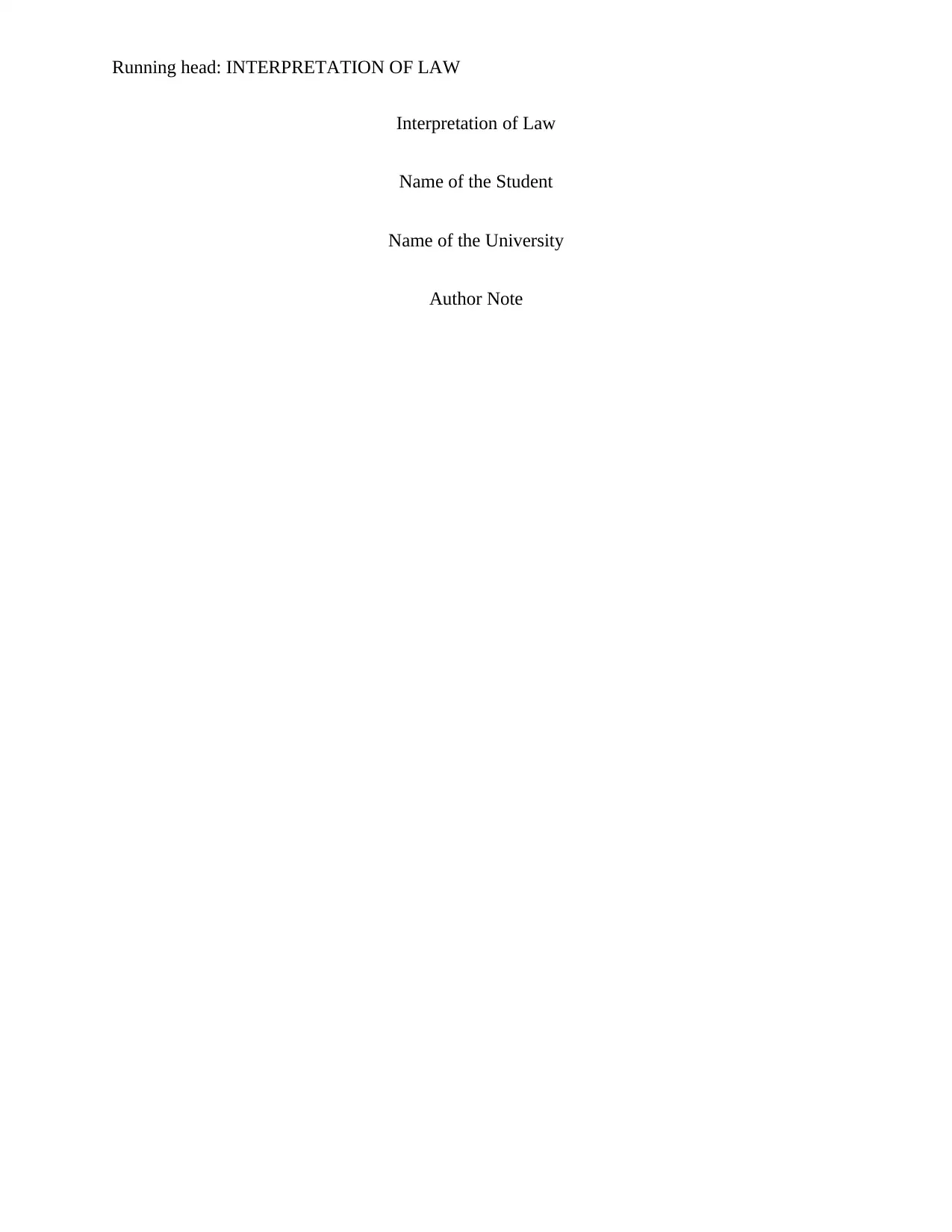
Running head: INTERPRETATION OF LAW
Interpretation of Law
Name of the Student
Name of the University
Author Note
Interpretation of Law
Name of the Student
Name of the University
Author Note
Paraphrase This Document
Need a fresh take? Get an instant paraphrase of this document with our AI Paraphraser
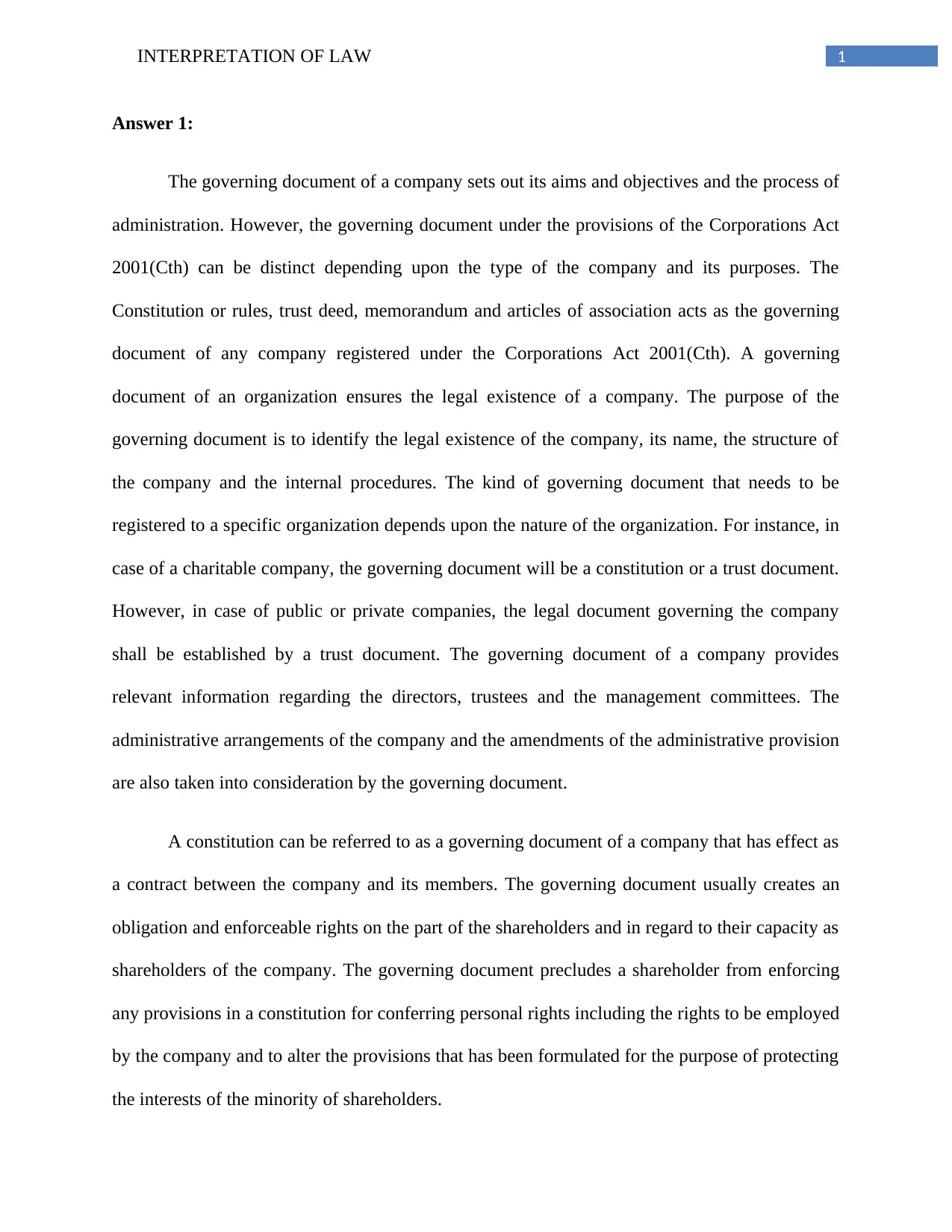
1INTERPRETATION OF LAW
Answer 1:
The governing document of a company sets out its aims and objectives and the process of
administration. However, the governing document under the provisions of the Corporations Act
2001(Cth) can be distinct depending upon the type of the company and its purposes. The
Constitution or rules, trust deed, memorandum and articles of association acts as the governing
document of any company registered under the Corporations Act 2001(Cth). A governing
document of an organization ensures the legal existence of a company. The purpose of the
governing document is to identify the legal existence of the company, its name, the structure of
the company and the internal procedures. The kind of governing document that needs to be
registered to a specific organization depends upon the nature of the organization. For instance, in
case of a charitable company, the governing document will be a constitution or a trust document.
However, in case of public or private companies, the legal document governing the company
shall be established by a trust document. The governing document of a company provides
relevant information regarding the directors, trustees and the management committees. The
administrative arrangements of the company and the amendments of the administrative provision
are also taken into consideration by the governing document.
A constitution can be referred to as a governing document of a company that has effect as
a contract between the company and its members. The governing document usually creates an
obligation and enforceable rights on the part of the shareholders and in regard to their capacity as
shareholders of the company. The governing document precludes a shareholder from enforcing
any provisions in a constitution for conferring personal rights including the rights to be employed
by the company and to alter the provisions that has been formulated for the purpose of protecting
the interests of the minority of shareholders.
Answer 1:
The governing document of a company sets out its aims and objectives and the process of
administration. However, the governing document under the provisions of the Corporations Act
2001(Cth) can be distinct depending upon the type of the company and its purposes. The
Constitution or rules, trust deed, memorandum and articles of association acts as the governing
document of any company registered under the Corporations Act 2001(Cth). A governing
document of an organization ensures the legal existence of a company. The purpose of the
governing document is to identify the legal existence of the company, its name, the structure of
the company and the internal procedures. The kind of governing document that needs to be
registered to a specific organization depends upon the nature of the organization. For instance, in
case of a charitable company, the governing document will be a constitution or a trust document.
However, in case of public or private companies, the legal document governing the company
shall be established by a trust document. The governing document of a company provides
relevant information regarding the directors, trustees and the management committees. The
administrative arrangements of the company and the amendments of the administrative provision
are also taken into consideration by the governing document.
A constitution can be referred to as a governing document of a company that has effect as
a contract between the company and its members. The governing document usually creates an
obligation and enforceable rights on the part of the shareholders and in regard to their capacity as
shareholders of the company. The governing document precludes a shareholder from enforcing
any provisions in a constitution for conferring personal rights including the rights to be employed
by the company and to alter the provisions that has been formulated for the purpose of protecting
the interests of the minority of shareholders.
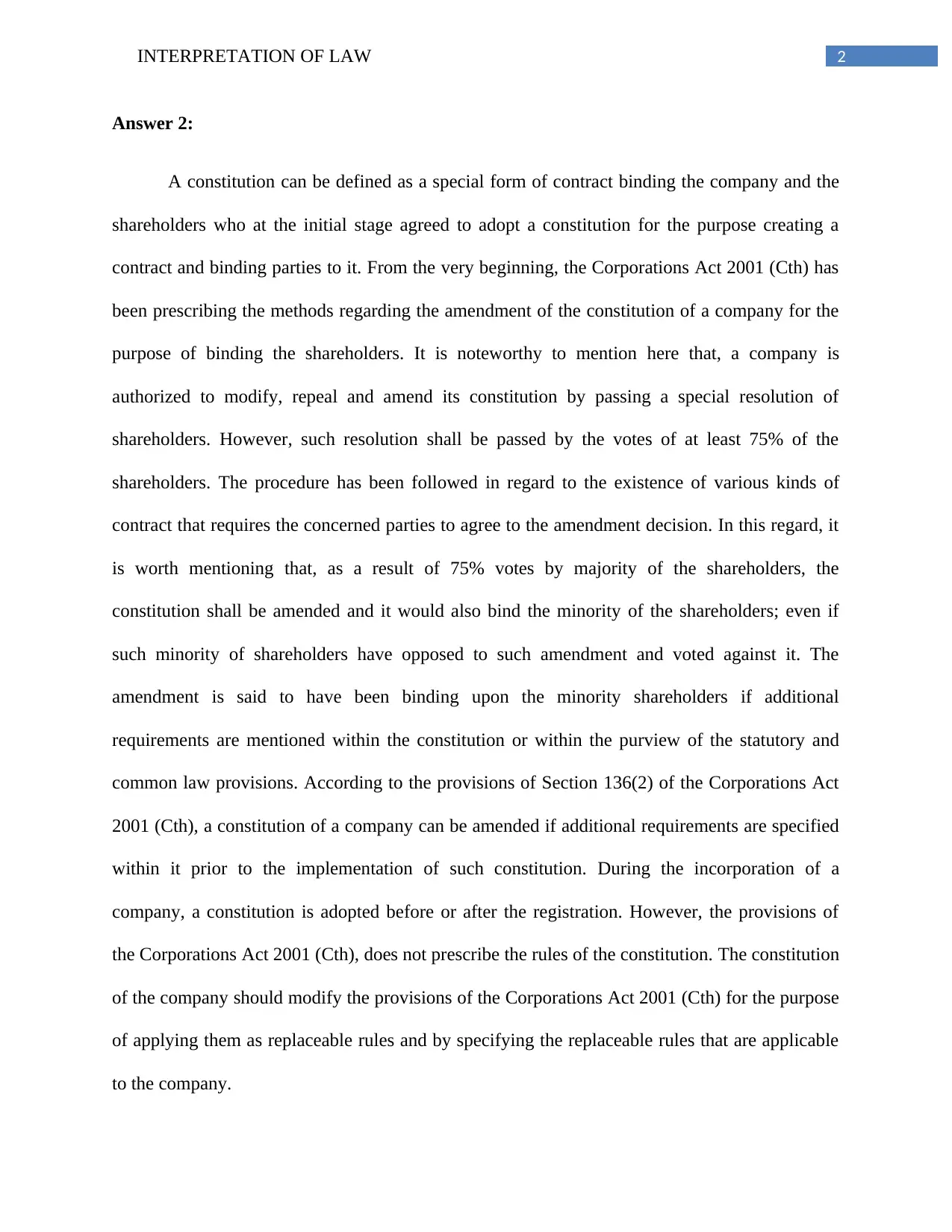
2INTERPRETATION OF LAW
Answer 2:
A constitution can be defined as a special form of contract binding the company and the
shareholders who at the initial stage agreed to adopt a constitution for the purpose creating a
contract and binding parties to it. From the very beginning, the Corporations Act 2001 (Cth) has
been prescribing the methods regarding the amendment of the constitution of a company for the
purpose of binding the shareholders. It is noteworthy to mention here that, a company is
authorized to modify, repeal and amend its constitution by passing a special resolution of
shareholders. However, such resolution shall be passed by the votes of at least 75% of the
shareholders. The procedure has been followed in regard to the existence of various kinds of
contract that requires the concerned parties to agree to the amendment decision. In this regard, it
is worth mentioning that, as a result of 75% votes by majority of the shareholders, the
constitution shall be amended and it would also bind the minority of the shareholders; even if
such minority of shareholders have opposed to such amendment and voted against it. The
amendment is said to have been binding upon the minority shareholders if additional
requirements are mentioned within the constitution or within the purview of the statutory and
common law provisions. According to the provisions of Section 136(2) of the Corporations Act
2001 (Cth), a constitution of a company can be amended if additional requirements are specified
within it prior to the implementation of such constitution. During the incorporation of a
company, a constitution is adopted before or after the registration. However, the provisions of
the Corporations Act 2001 (Cth), does not prescribe the rules of the constitution. The constitution
of the company should modify the provisions of the Corporations Act 2001 (Cth) for the purpose
of applying them as replaceable rules and by specifying the replaceable rules that are applicable
to the company.
Answer 2:
A constitution can be defined as a special form of contract binding the company and the
shareholders who at the initial stage agreed to adopt a constitution for the purpose creating a
contract and binding parties to it. From the very beginning, the Corporations Act 2001 (Cth) has
been prescribing the methods regarding the amendment of the constitution of a company for the
purpose of binding the shareholders. It is noteworthy to mention here that, a company is
authorized to modify, repeal and amend its constitution by passing a special resolution of
shareholders. However, such resolution shall be passed by the votes of at least 75% of the
shareholders. The procedure has been followed in regard to the existence of various kinds of
contract that requires the concerned parties to agree to the amendment decision. In this regard, it
is worth mentioning that, as a result of 75% votes by majority of the shareholders, the
constitution shall be amended and it would also bind the minority of the shareholders; even if
such minority of shareholders have opposed to such amendment and voted against it. The
amendment is said to have been binding upon the minority shareholders if additional
requirements are mentioned within the constitution or within the purview of the statutory and
common law provisions. According to the provisions of Section 136(2) of the Corporations Act
2001 (Cth), a constitution of a company can be amended if additional requirements are specified
within it prior to the implementation of such constitution. During the incorporation of a
company, a constitution is adopted before or after the registration. However, the provisions of
the Corporations Act 2001 (Cth), does not prescribe the rules of the constitution. The constitution
of the company should modify the provisions of the Corporations Act 2001 (Cth) for the purpose
of applying them as replaceable rules and by specifying the replaceable rules that are applicable
to the company.
⊘ This is a preview!⊘
Do you want full access?
Subscribe today to unlock all pages.

Trusted by 1+ million students worldwide
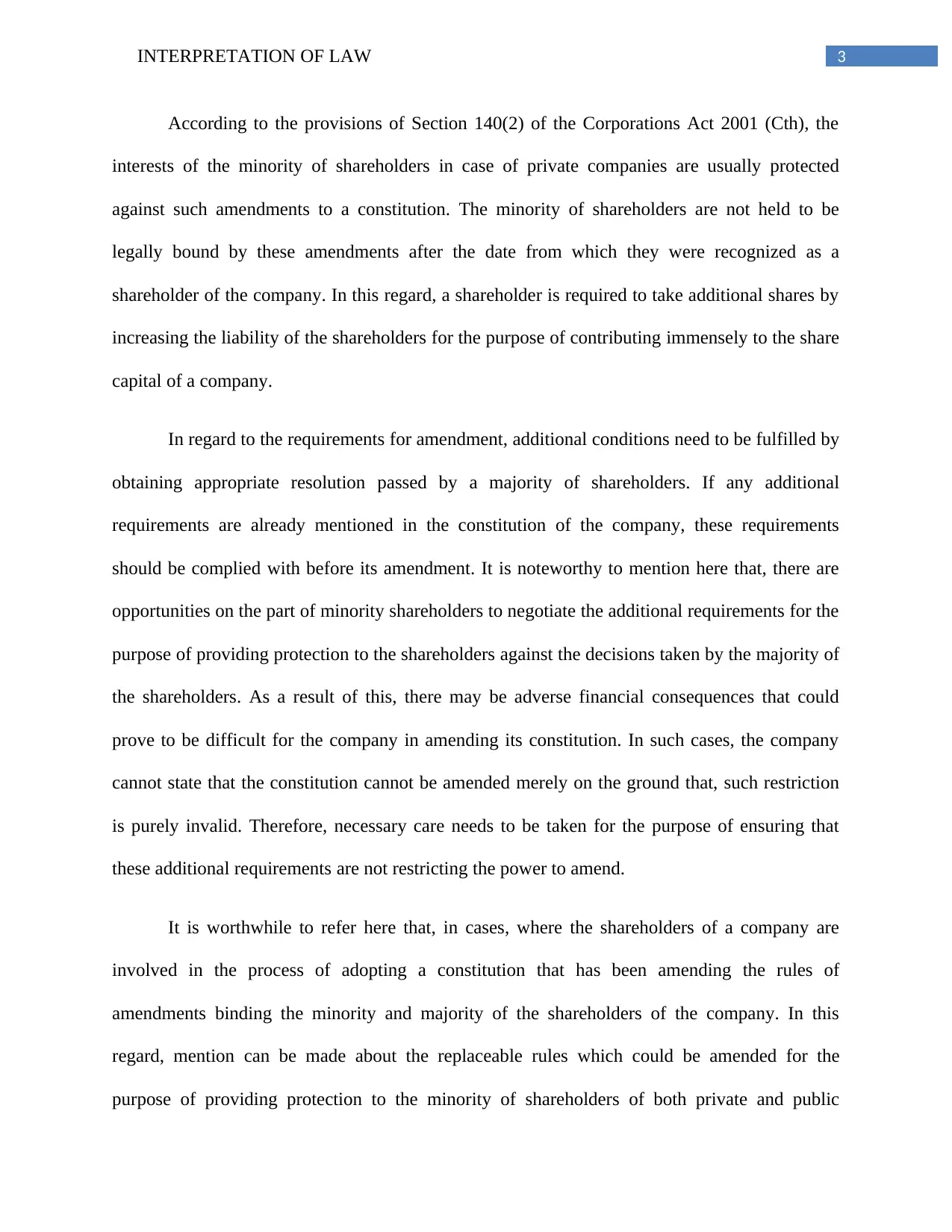
3INTERPRETATION OF LAW
According to the provisions of Section 140(2) of the Corporations Act 2001 (Cth), the
interests of the minority of shareholders in case of private companies are usually protected
against such amendments to a constitution. The minority of shareholders are not held to be
legally bound by these amendments after the date from which they were recognized as a
shareholder of the company. In this regard, a shareholder is required to take additional shares by
increasing the liability of the shareholders for the purpose of contributing immensely to the share
capital of a company.
In regard to the requirements for amendment, additional conditions need to be fulfilled by
obtaining appropriate resolution passed by a majority of shareholders. If any additional
requirements are already mentioned in the constitution of the company, these requirements
should be complied with before its amendment. It is noteworthy to mention here that, there are
opportunities on the part of minority shareholders to negotiate the additional requirements for the
purpose of providing protection to the shareholders against the decisions taken by the majority of
the shareholders. As a result of this, there may be adverse financial consequences that could
prove to be difficult for the company in amending its constitution. In such cases, the company
cannot state that the constitution cannot be amended merely on the ground that, such restriction
is purely invalid. Therefore, necessary care needs to be taken for the purpose of ensuring that
these additional requirements are not restricting the power to amend.
It is worthwhile to refer here that, in cases, where the shareholders of a company are
involved in the process of adopting a constitution that has been amending the rules of
amendments binding the minority and majority of the shareholders of the company. In this
regard, mention can be made about the replaceable rules which could be amended for the
purpose of providing protection to the minority of shareholders of both private and public
According to the provisions of Section 140(2) of the Corporations Act 2001 (Cth), the
interests of the minority of shareholders in case of private companies are usually protected
against such amendments to a constitution. The minority of shareholders are not held to be
legally bound by these amendments after the date from which they were recognized as a
shareholder of the company. In this regard, a shareholder is required to take additional shares by
increasing the liability of the shareholders for the purpose of contributing immensely to the share
capital of a company.
In regard to the requirements for amendment, additional conditions need to be fulfilled by
obtaining appropriate resolution passed by a majority of shareholders. If any additional
requirements are already mentioned in the constitution of the company, these requirements
should be complied with before its amendment. It is noteworthy to mention here that, there are
opportunities on the part of minority shareholders to negotiate the additional requirements for the
purpose of providing protection to the shareholders against the decisions taken by the majority of
the shareholders. As a result of this, there may be adverse financial consequences that could
prove to be difficult for the company in amending its constitution. In such cases, the company
cannot state that the constitution cannot be amended merely on the ground that, such restriction
is purely invalid. Therefore, necessary care needs to be taken for the purpose of ensuring that
these additional requirements are not restricting the power to amend.
It is worthwhile to refer here that, in cases, where the shareholders of a company are
involved in the process of adopting a constitution that has been amending the rules of
amendments binding the minority and majority of the shareholders of the company. In this
regard, mention can be made about the replaceable rules which could be amended for the
purpose of providing protection to the minority of shareholders of both private and public
Paraphrase This Document
Need a fresh take? Get an instant paraphrase of this document with our AI Paraphraser
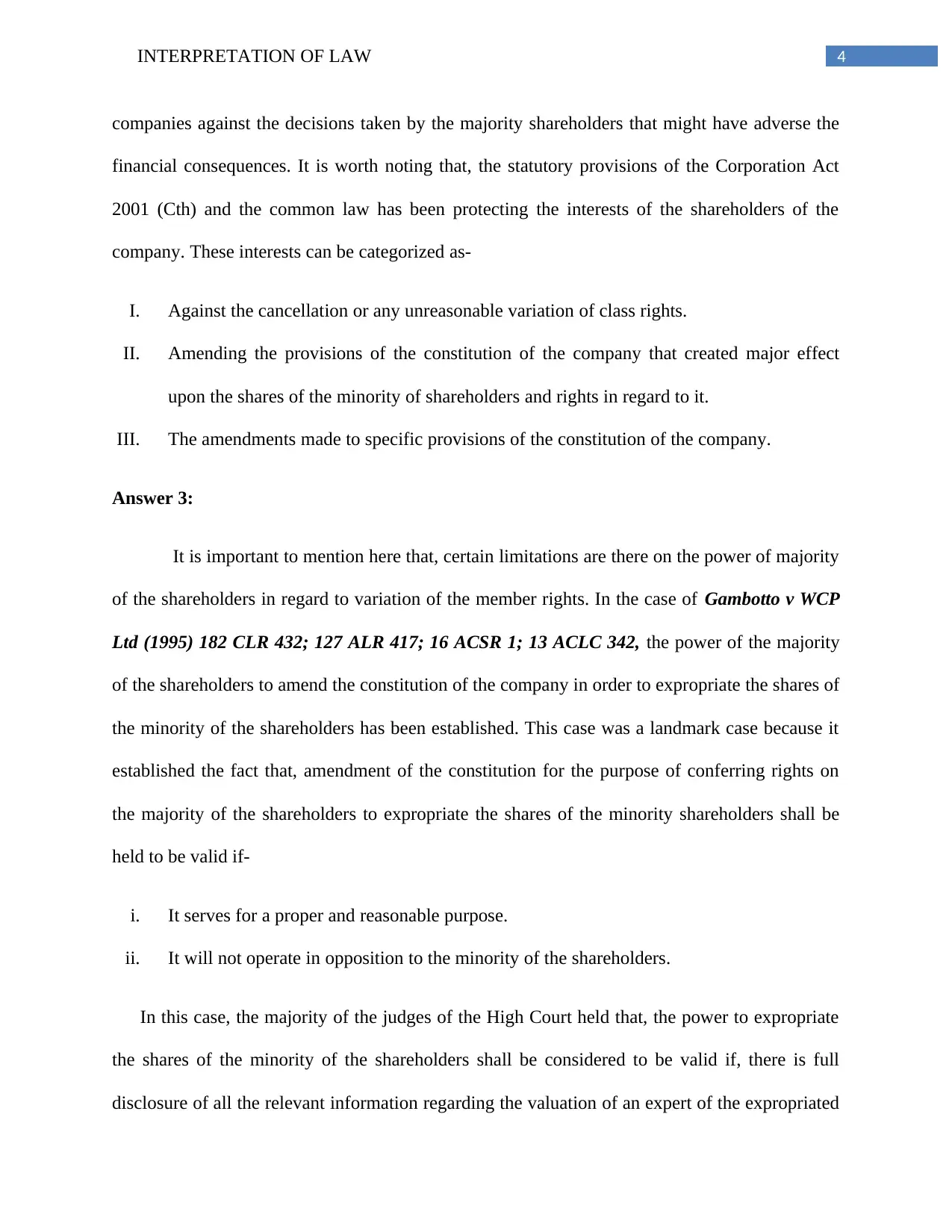
4INTERPRETATION OF LAW
companies against the decisions taken by the majority shareholders that might have adverse the
financial consequences. It is worth noting that, the statutory provisions of the Corporation Act
2001 (Cth) and the common law has been protecting the interests of the shareholders of the
company. These interests can be categorized as-
I. Against the cancellation or any unreasonable variation of class rights.
II. Amending the provisions of the constitution of the company that created major effect
upon the shares of the minority of shareholders and rights in regard to it.
III. The amendments made to specific provisions of the constitution of the company.
Answer 3:
It is important to mention here that, certain limitations are there on the power of majority
of the shareholders in regard to variation of the member rights. In the case of Gambotto v WCP
Ltd (1995) 182 CLR 432; 127 ALR 417; 16 ACSR 1; 13 ACLC 342, the power of the majority
of the shareholders to amend the constitution of the company in order to expropriate the shares of
the minority of the shareholders has been established. This case was a landmark case because it
established the fact that, amendment of the constitution for the purpose of conferring rights on
the majority of the shareholders to expropriate the shares of the minority shareholders shall be
held to be valid if-
i. It serves for a proper and reasonable purpose.
ii. It will not operate in opposition to the minority of the shareholders.
In this case, the majority of the judges of the High Court held that, the power to expropriate
the shares of the minority of the shareholders shall be considered to be valid if, there is full
disclosure of all the relevant information regarding the valuation of an expert of the expropriated
companies against the decisions taken by the majority shareholders that might have adverse the
financial consequences. It is worth noting that, the statutory provisions of the Corporation Act
2001 (Cth) and the common law has been protecting the interests of the shareholders of the
company. These interests can be categorized as-
I. Against the cancellation or any unreasonable variation of class rights.
II. Amending the provisions of the constitution of the company that created major effect
upon the shares of the minority of shareholders and rights in regard to it.
III. The amendments made to specific provisions of the constitution of the company.
Answer 3:
It is important to mention here that, certain limitations are there on the power of majority
of the shareholders in regard to variation of the member rights. In the case of Gambotto v WCP
Ltd (1995) 182 CLR 432; 127 ALR 417; 16 ACSR 1; 13 ACLC 342, the power of the majority
of the shareholders to amend the constitution of the company in order to expropriate the shares of
the minority of the shareholders has been established. This case was a landmark case because it
established the fact that, amendment of the constitution for the purpose of conferring rights on
the majority of the shareholders to expropriate the shares of the minority shareholders shall be
held to be valid if-
i. It serves for a proper and reasonable purpose.
ii. It will not operate in opposition to the minority of the shareholders.
In this case, the majority of the judges of the High Court held that, the power to expropriate
the shares of the minority of the shareholders shall be considered to be valid if, there is full
disclosure of all the relevant information regarding the valuation of an expert of the expropriated
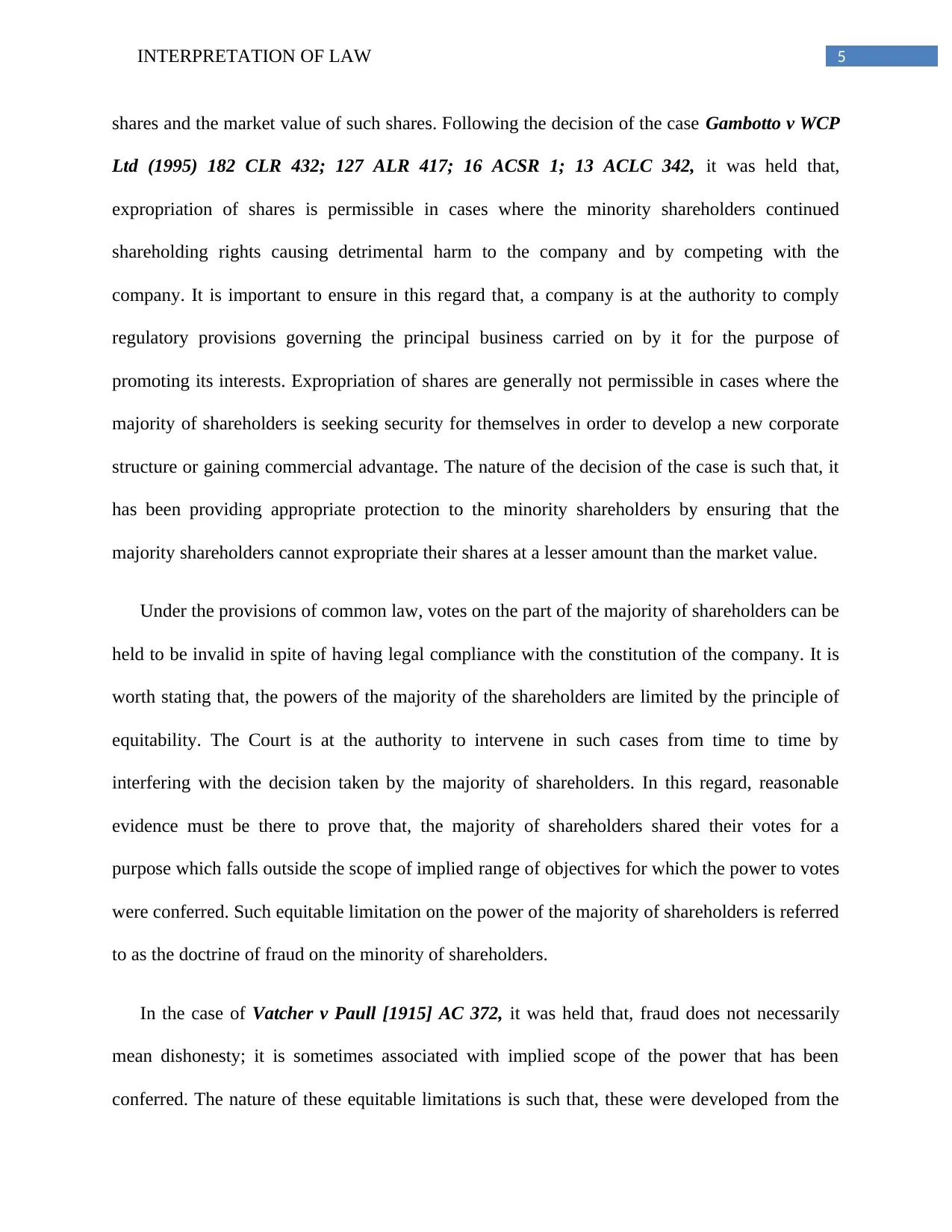
5INTERPRETATION OF LAW
shares and the market value of such shares. Following the decision of the case Gambotto v WCP
Ltd (1995) 182 CLR 432; 127 ALR 417; 16 ACSR 1; 13 ACLC 342, it was held that,
expropriation of shares is permissible in cases where the minority shareholders continued
shareholding rights causing detrimental harm to the company and by competing with the
company. It is important to ensure in this regard that, a company is at the authority to comply
regulatory provisions governing the principal business carried on by it for the purpose of
promoting its interests. Expropriation of shares are generally not permissible in cases where the
majority of shareholders is seeking security for themselves in order to develop a new corporate
structure or gaining commercial advantage. The nature of the decision of the case is such that, it
has been providing appropriate protection to the minority shareholders by ensuring that the
majority shareholders cannot expropriate their shares at a lesser amount than the market value.
Under the provisions of common law, votes on the part of the majority of shareholders can be
held to be invalid in spite of having legal compliance with the constitution of the company. It is
worth stating that, the powers of the majority of the shareholders are limited by the principle of
equitability. The Court is at the authority to intervene in such cases from time to time by
interfering with the decision taken by the majority of shareholders. In this regard, reasonable
evidence must be there to prove that, the majority of shareholders shared their votes for a
purpose which falls outside the scope of implied range of objectives for which the power to votes
were conferred. Such equitable limitation on the power of the majority of shareholders is referred
to as the doctrine of fraud on the minority of shareholders.
In the case of Vatcher v Paull [1915] AC 372, it was held that, fraud does not necessarily
mean dishonesty; it is sometimes associated with implied scope of the power that has been
conferred. The nature of these equitable limitations is such that, these were developed from the
shares and the market value of such shares. Following the decision of the case Gambotto v WCP
Ltd (1995) 182 CLR 432; 127 ALR 417; 16 ACSR 1; 13 ACLC 342, it was held that,
expropriation of shares is permissible in cases where the minority shareholders continued
shareholding rights causing detrimental harm to the company and by competing with the
company. It is important to ensure in this regard that, a company is at the authority to comply
regulatory provisions governing the principal business carried on by it for the purpose of
promoting its interests. Expropriation of shares are generally not permissible in cases where the
majority of shareholders is seeking security for themselves in order to develop a new corporate
structure or gaining commercial advantage. The nature of the decision of the case is such that, it
has been providing appropriate protection to the minority shareholders by ensuring that the
majority shareholders cannot expropriate their shares at a lesser amount than the market value.
Under the provisions of common law, votes on the part of the majority of shareholders can be
held to be invalid in spite of having legal compliance with the constitution of the company. It is
worth stating that, the powers of the majority of the shareholders are limited by the principle of
equitability. The Court is at the authority to intervene in such cases from time to time by
interfering with the decision taken by the majority of shareholders. In this regard, reasonable
evidence must be there to prove that, the majority of shareholders shared their votes for a
purpose which falls outside the scope of implied range of objectives for which the power to votes
were conferred. Such equitable limitation on the power of the majority of shareholders is referred
to as the doctrine of fraud on the minority of shareholders.
In the case of Vatcher v Paull [1915] AC 372, it was held that, fraud does not necessarily
mean dishonesty; it is sometimes associated with implied scope of the power that has been
conferred. The nature of these equitable limitations is such that, these were developed from the
⊘ This is a preview!⊘
Do you want full access?
Subscribe today to unlock all pages.

Trusted by 1+ million students worldwide
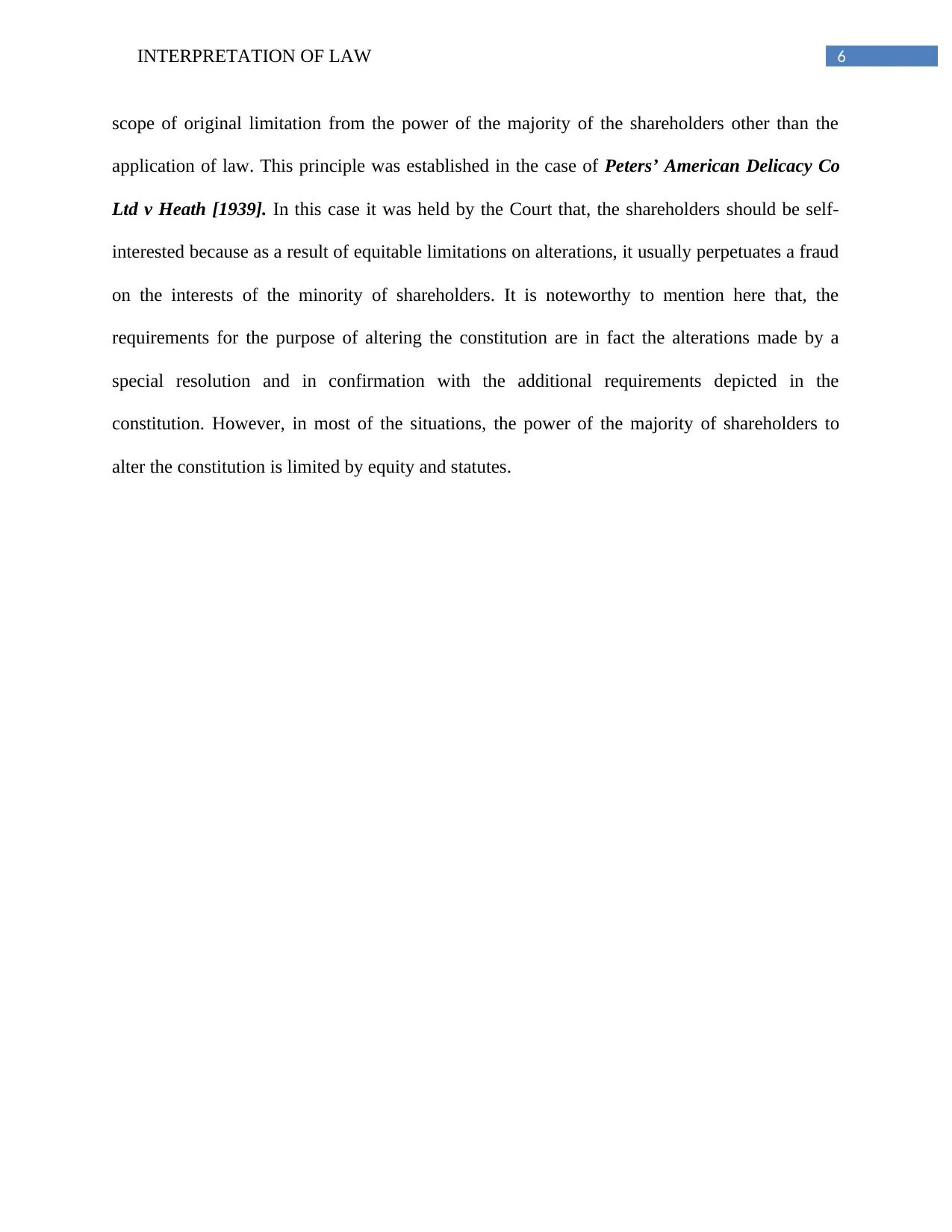
6INTERPRETATION OF LAW
scope of original limitation from the power of the majority of the shareholders other than the
application of law. This principle was established in the case of Peters’ American Delicacy Co
Ltd v Heath [1939]. In this case it was held by the Court that, the shareholders should be self-
interested because as a result of equitable limitations on alterations, it usually perpetuates a fraud
on the interests of the minority of shareholders. It is noteworthy to mention here that, the
requirements for the purpose of altering the constitution are in fact the alterations made by a
special resolution and in confirmation with the additional requirements depicted in the
constitution. However, in most of the situations, the power of the majority of shareholders to
alter the constitution is limited by equity and statutes.
scope of original limitation from the power of the majority of the shareholders other than the
application of law. This principle was established in the case of Peters’ American Delicacy Co
Ltd v Heath [1939]. In this case it was held by the Court that, the shareholders should be self-
interested because as a result of equitable limitations on alterations, it usually perpetuates a fraud
on the interests of the minority of shareholders. It is noteworthy to mention here that, the
requirements for the purpose of altering the constitution are in fact the alterations made by a
special resolution and in confirmation with the additional requirements depicted in the
constitution. However, in most of the situations, the power of the majority of shareholders to
alter the constitution is limited by equity and statutes.
Paraphrase This Document
Need a fresh take? Get an instant paraphrase of this document with our AI Paraphraser
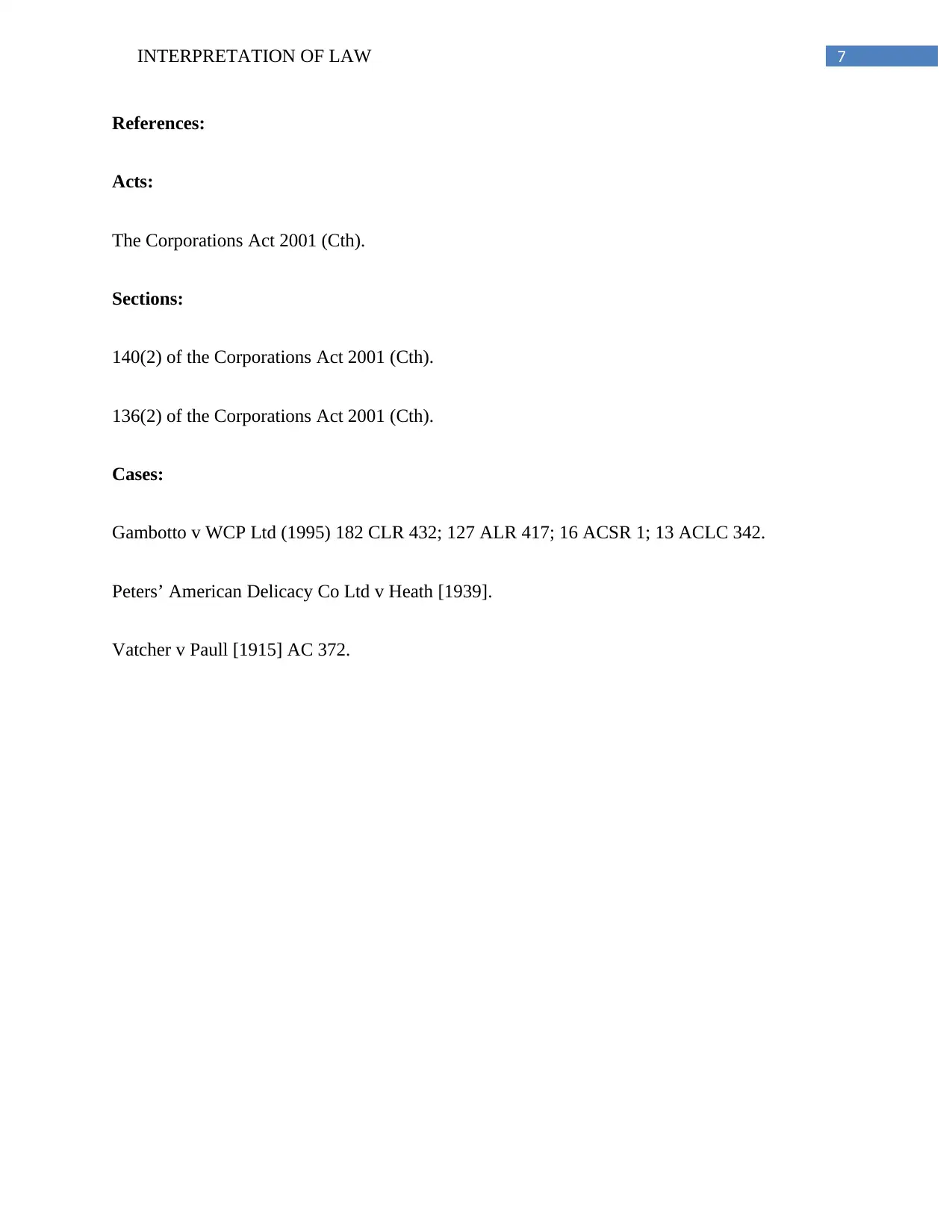
7INTERPRETATION OF LAW
References:
Acts:
The Corporations Act 2001 (Cth).
Sections:
140(2) of the Corporations Act 2001 (Cth).
136(2) of the Corporations Act 2001 (Cth).
Cases:
Gambotto v WCP Ltd (1995) 182 CLR 432; 127 ALR 417; 16 ACSR 1; 13 ACLC 342.
Peters’ American Delicacy Co Ltd v Heath [1939].
Vatcher v Paull [1915] AC 372.
References:
Acts:
The Corporations Act 2001 (Cth).
Sections:
140(2) of the Corporations Act 2001 (Cth).
136(2) of the Corporations Act 2001 (Cth).
Cases:
Gambotto v WCP Ltd (1995) 182 CLR 432; 127 ALR 417; 16 ACSR 1; 13 ACLC 342.
Peters’ American Delicacy Co Ltd v Heath [1939].
Vatcher v Paull [1915] AC 372.
1 out of 8
Related Documents
Your All-in-One AI-Powered Toolkit for Academic Success.
+13062052269
info@desklib.com
Available 24*7 on WhatsApp / Email
![[object Object]](/_next/static/media/star-bottom.7253800d.svg)
Unlock your academic potential
© 2024 | Zucol Services PVT LTD | All rights reserved.




